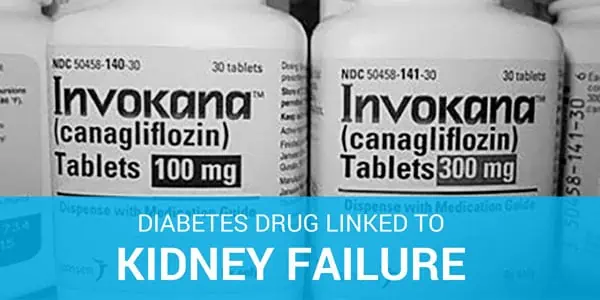Invokana Lawsuits Alleging Kidney Failure Filed
- Last Updated: August 4th, 2023

Attorney Jessica Paluch-Hoerman, founder of TruLaw, has over 28 years of experience as a personal injury and mass tort attorney, and previously worked as an international tax attorney at Deloitte. Jessie collaborates with attorneys nationwide — enabling her to share reliable, up-to-date legal information with our readers.
Legally Reviewed
This article has been written and reviewed for legal accuracy and clarity by the team of writers and legal experts at TruLaw and is as accurate as possible. This content should not be taken as legal advice from an attorney. If you would like to learn more about our owner and experienced injury lawyer, Jessie Paluch, you can do so here.
Fact-Checked
TruLaw does everything possible to make sure the information in this article is up to date and accurate. If you need specific legal advice about your case, contact us by using the chat on the bottom of this page. This article should not be taken as advice from an attorney.
Invokana Lawsuits Alleging Kidney Failure Filed
The number of lawsuits brought against the maker of the diabetes drug Invokana continues to grow, with another Invokana lawsuit being filed on March 31, 2016, in the Superior Court of the State of Delaware.

The plaintiff, a type 2 diabetes patient, claims that after taking Invokana to lower her blood sugar levels, she suffered kidney failure, a bone fracture, and other serious injuries that led to her hospitalization.
She alleges that Invokana maker, Janssen Pharmaceuticals (and parent company Johnson & Johnson):
- Failed to conduct proper safety studies on the drug before releasing it onto the market
- Failed to publicize alarming safety signals
- Suppressed information revealing serious and life-threatening risks connected with the medication
The woman alleges that because of the negligence of the defendants, she and her health care practitioners were unaware of the true nature of Invokana and the significant risks associated with the medication, adding that the drug’s label still does not give adequate warnings regarding the serious risks of bone fractures and kidney injuries associated with Invokana use.
Table of Contents
Invokana Lawsuits
Individuals who have been harmed by Invokana are currently filing Invokana lawsuits against the manufacturer, Janssen, a division of Johnson & Johnson.
Invokana lawsuits claim the manufacturer of the drug, Janssen/Johnson & Johnson knew about the risk of kidney damage, diabetic ketoacidosis but did not warn the public or health practitioners leaving them to make uninformed medical decisions that put them at risk.
Since the FDA took action with label changes and Drug Safety Communications, more plaintiffs have filed Invokana lawsuits some alleging Diabetic Ketoacidosis.
These lawsuits will continue to move forward in courts across the United States until there this the need for consolidation into a multidistrict litigation (MDL), which would allow common issues to be discussed on behalf of all injured individuals.
There have been no Invokana settlements and the product liability cases being filed are not Invokana Class Action Lawsuits.
SGLT-2 Inhibitors
The U.S. Food and Drug Administration (FDA) approved Invokana in March 2013 for the treatment of type 2 diabetes.
Part of a new class of diabetes drugs known as “sodium-glucose co-transporter 2 (SGLT-2) inhibitors,” Invokana works by preventing the kidneys from absorbing glucose, and instead excreting it from the body through the urine.
This action is now thought to put additional stress on the kidneys, particularly in those already at risk for kidney disease.
In September 2015, the FDA announced that it would require Invokana manufacturers to add new warnings to the drug’s label, indicating that it could increase the risk of bone fracture, and cautioning healthcare practitioners to consider factors that contribute to fracture prior to prescribing the medication.

Managing Attorney & Owner
With over 25 years of legal experience, Jessica Paluch-Hoerman is an Illinois lawyer, a CPA, and a mother of three. She spent the first decade of her career working as an international tax attorney at Deloitte.
In 2009, Jessie co-founded her own law firm with her husband – which has scaled to over 30 employees since its conception.
In 2016, Jessie founded TruLaw, which allows her to collaborate with attorneys and legal experts across the United States on a daily basis. This hypervaluable network of experts is what enables her to share the most reliable, accurate, and up-to-date legal information with our readers!
Here, at TruLaw, we’re committed to helping victims get the justice they deserve.
Alongside our partner law firms, we have successfully collected over $3 Billion in verdicts and settlements on behalf of injured individuals.
Would you like our help?
At TruLaw, we fiercely combat corporations that endanger individuals’ well-being. If you’ve suffered injuries and believe these well-funded entities should be held accountable, we’re here for you.
With TruLaw, you gain access to successful and seasoned lawyers who maximize your chances of success. Our lawyers invest in you—they do not receive a dime until your lawsuit reaches a successful resolution!
AFFF Lawsuit claims are being filed against manufacturers of aqueous film-forming foam (AFFF), commonly used in firefighting.
Claims allege that companies such as 3M, DuPont, and Tyco Fire Products failed to adequately warn users about the potential dangers of AFFF exposure — including increased risks of various cancers and diseases.
Depo Provera Lawsuit claims are being filed by individuals who allege they developed meningioma (a type of brain tumor) after receiving Depo-Provera birth control injections.
A 2024 study found that women using Depo-Provera for at least 1 year are five times more likely to develop meningioma brain tumors compared to those not using the drug.
Suboxone Tooth Decay Lawsuit claims are being filed against Indivior, the manufacturer of Suboxone, a medication used to treat opioid addiction.
Claims allege that Indivior failed to adequately warn users about the potential dangers of severe tooth decay and dental injuries associated with Suboxone’s sublingual film version.
Social Media Harm Lawsuits are being filed against social media companies for allegedly causing mental health issues in children and teens.
Claims allege that companies like Meta, Google, ByteDance, and Snap designed addictive platforms that led to anxiety, depression, and other mental health issues without adequately warning users or parents.
Transvaginal Mesh Lawsuits are being filed against manufacturers of transvaginal mesh products used to treat pelvic organ prolapse (POP) and stress urinary incontinence (SUI).
Claims allege that companies like Ethicon, C.R. Bard, and Boston Scientific failed to adequately warn about potential dangers — including erosion, pain, and infection.
Bair Hugger Warming Blanket Lawsuits involve claims against 3M — alleging their surgical warming blankets caused severe infections and complications (particularly in hip and knee replacement surgeries).
Plaintiffs claim 3M failed to warn about potential risks — despite knowing about increased risk of deep joint infections since 2011.
Baby Formula NEC Lawsuit claims are being filed against manufacturers of cow’s milk-based baby formula products.
Claims allege that companies like Abbott Laboratories (Similac) and Mead Johnson & Company (Enfamil) failed to warn about the increased risk of necrotizing enterocolitis (NEC) in premature infants.
Here, at TruLaw, we’re committed to helping victims get the justice they deserve.
Alongside our partner law firms, we have successfully collected over $3 Billion in verdicts and settlements on behalf of injured individuals.
Would you like our help?












